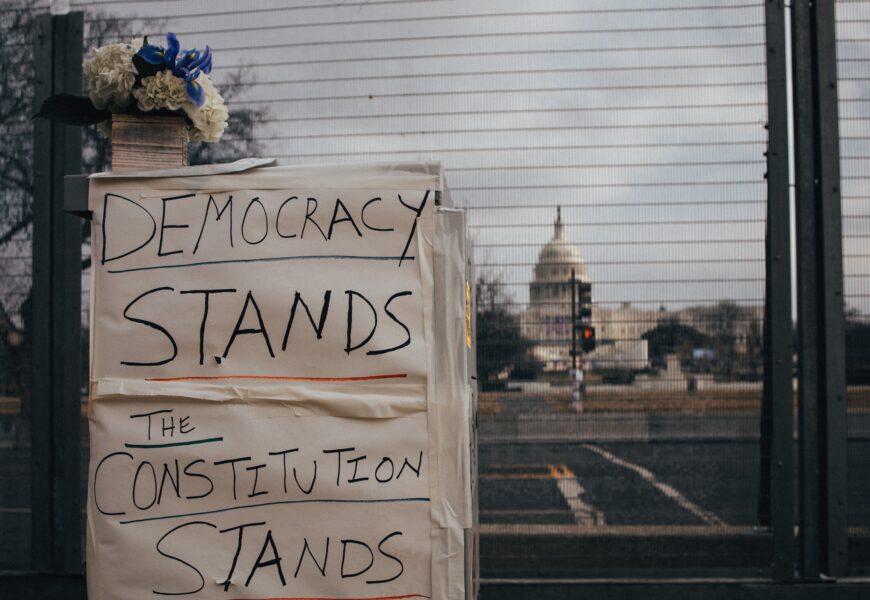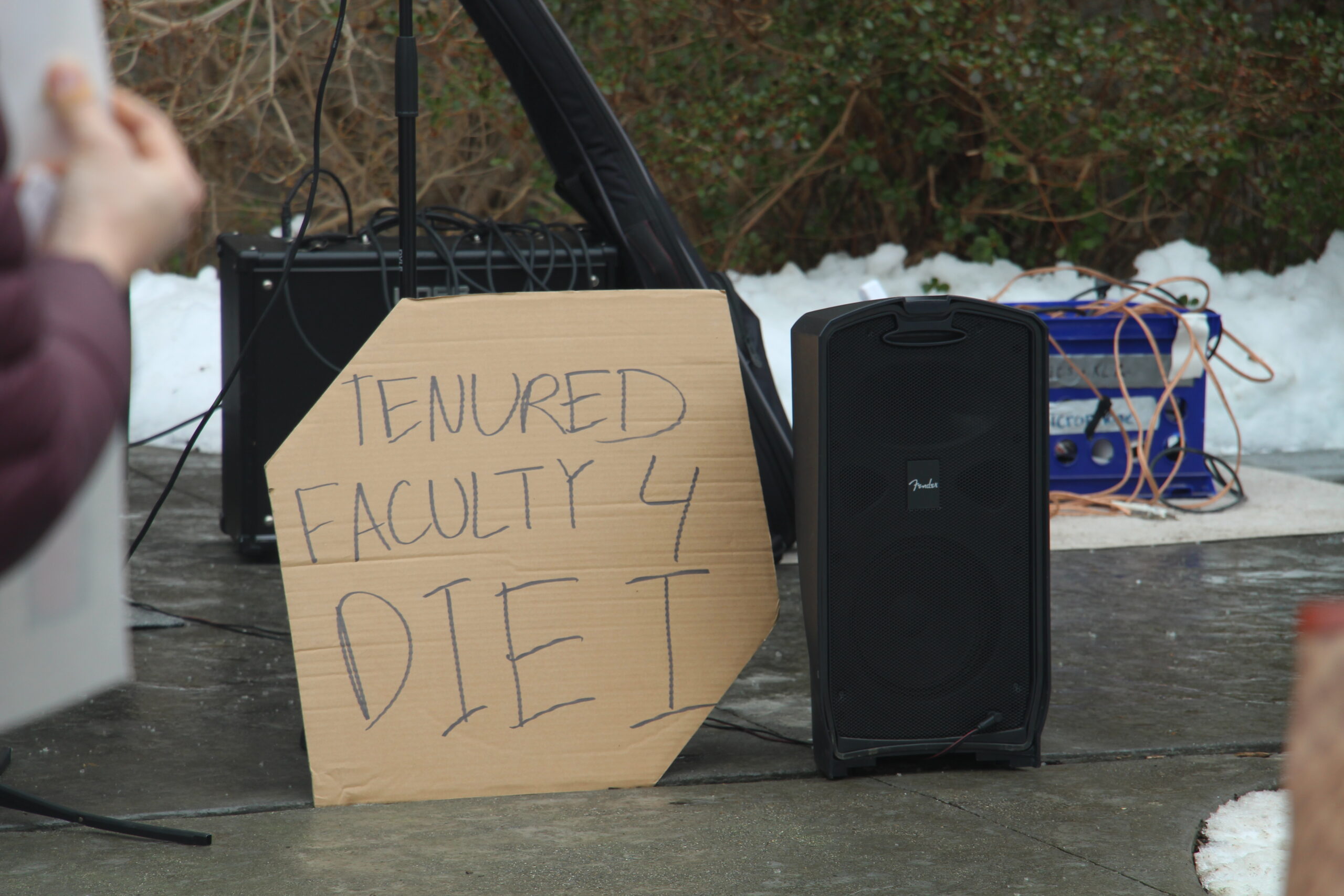Photo Courtesy of Unsplash.
In early December, Gabriel Sterling, a Republican Georgian election official declared, “Someone’s going to get hurt, someone’s going to get shot, someone’s going to get killed” in response to lies of a rigged election from President Trump. A month later, a mob of Trump fanatics stormed the US Capitol, disrupting Congress’ certification of the Electoral College votes through the first combative occupation of the U.S. Capitol since the British burned the building in 1814. In cult-like fashion Donald Trump organized and summoned his supporters to Washington D.C. and directed them to march to the Capitol as an act of pressuring Congress against performing their constitutional duty to certifying state electors. The argument for Trump’s removal from the presidency has never been stronger. Aside from the violence done by the groypers, the act of the executive branch challenging the authority of the legislative branch was plenty to result in the impeachment of President Andrew Johnson, the only president to be impeached in the nation’s first two-hundred years.
Unfortunately, the argument for Trump’s removal from office does not end there. Trump’s mob stormed into the Capitol, easily pushing through Capitol Hill Police, with one rioter shouting “we are listening to Trump.” The horde entered the Capitol chanting “hang Mike Pence” while others beat police officers with ‘blue lives matter’ flags. Just minutes after Congress was evacuated, a horned barbarian presided over the Senate Chamber in the chair of Vice President Mike Pence. During these horrid events, President Trump occupied himself by Tweeting attacks at his own Vice President for upholding his constitutional duty, while later sending a video message passively asking the mob stop to the violence, telling those who brutally murdered Officer Brian Sicknick and disrupted the democratic process, “we love you.”
Of course, Trump neither participated nor directly ordered violence on the Capitol. So what was Trump’s involvement in the instigation of the Capitol attack? Two months of propagating lies of a “stolen” and “massively fraudulent” election. Trump had every right to pursue his legal avenues through presenting his case to the courts, which were countlessly rejected on account of baseless allegations and lack of evidence. However, pursuing legal actions for the investigation of potential voter fraud do not justify feeding the public lies that the election was deviously stolen by their political adversaries. Furthermore, after all the legal routes were thoroughly explored and rejected, Trump continued the propagation of lies, telling Georgia’s Secretary of State, Brad Raffensperger “I just want to find 11,780 votes,” an arguably coercive statement worthy of impeachment in itself.
Not only is it blatantly clear that Donald Trump is no longer fit for the duties of President of the United States, Trump no longer has any intent of fulfilling those duties outside of his own personal interests, as evidenced by his lack of defensive action during the Capitol attack, with defensive orders having to come from Vice President Mike Pence. The case for articles of impeachment brought upon President Trump had never been stronger for any President of the United States.
Despite the strong case for Trump’s impeachment, Speaker Nancy Pelosi (D-CA) and other House Democratic leaders could not prevent themselves from acting in petty partisanship, butchering the impeachment process. Following the events on January 6, Pelosi led the House to a vote on sending a letter to Vice President Pence asking him to invoke the 25th Amendment, delaying the impeachment process. Invoking the 25th Amendment—Trump’s cabinet ruling Trump unfit for president and handing presidential duties to Pence—was completely justified and necessary. However, the 25th Amendment is an executive action, with authority residing within the executive branch. It is no place for the House to govern. The letter was a clear intervention of the legislative branch on the executive’s authority.
When articles of impeachment were eventually presented in the House, the charge against Trump was “incitement of insurrection.” While Trump’s actions provoked the storming of the Capitol, no court would charge Trump with “inciting an insurrection” as he never directed his mob to attack the Capitol or cause violence. Because impeachment is a political indictment and not a criminal charge, the overcharge does not invalidate the case for Trump’s impeachment. However, it was enough for some Republican congressmen to vote against impeachment. Reps. Dan Crenshaw (R-TX), Chip Roy (R-TX), Nancy Mace (R-SC), and John Curtis (R-UT), all of who spared no criticism for the “reckless” actions of President Trump, announced in a public statement that they would vote against impeachment as “the articles are flawed, charging crimes that are lacking the requisite element of intent.”
To further the impeachment botchery, all nine impeachment managers that Pelosi named were Democrats, including Rep. Jamie Raskin (D-MD), who objected to the electoral certification of the 2016 election on equally baseless claims as Sen. Josh Hawley (R-MO) and Sen. Ted Cruz (R-TX) made for the 2020 election. If Pelosi wanted to share President Biden’s message of unity, a good start would have been appointing a Republican as an impeachment manager, or at least allowing one to speak. When Rep. Jaime Herrera Beutler (R-WA) asked Pelosi for seven minutes on the floor to help convince her Republicans colleagues to vote for impeachment, Pelosi granted Beutler only one minute.
The Senate has since begun the conviction and trial process, sparking discussions on the constitutionality of conviction after leaving office. While the Constitution doesn’t mention conviction after leaving office, it states “The Senate shall have the sole Power to try all Impeachments.” While the constitutionality of a post-presidency impeachment is in doubt, the Senate has a constitutional responsibility to try the impeachment, as the second impeachment of Trump was legitimate since it occurred while he was still in office.
Historical context and precedent provides further support: during the founding days of the country, Virginia’s State Constitution only allowed impeachment of a Governor after they had left office. Furthermore, in 1876 the Senate voted that they had the authority to vote to convict former Sec. of War William Belknap after he had resigned (the Senate ended up voting to acquit him). Based on this reasoning, it would be acceptable to push impeachment charges on President Trump once he has left office.
Some members of Congress, including Sen. Tim Kaine (D-VA) and Rep. Alexandria Ocasio-Cortez (D-NY), have suggested implementing the 14th Amendment to bar Trump from holding future office. The 14th Amendment, written and ratified following the Civil War, barred former or current public officials who “have engaged in insurrection or rebellion against the same, or given aid or comfort to the enemies thereof.” The problem with this course of action is—like the articles of impeachment—Trump is not legally guilty of “engaging in insurrection or rebellion.” The context of “engaging in insurrection or rebellion” at the time it was written, was to prevent public officials or soldiers of the Confederacy from holding office again. While Trump undoubtedly deserves to be removed from office, there is not enough evidence to convict Trump under the text provided in the 14th Amendment. While the articles of impeachment share a similar flaw, impeachment is a political trial, unlike the 14th Amendment.
Despite Trump having already left office, it is crucial that the Senate vote to convict Donald Trump. The United States must demonstrate that this behavior—summoning a mob to pressure another branch of government—is unacceptable. Choosing not to condemn this behavior could set a precedent for another president to act similarly, using the defense of Trump’s second acquittal as validation. The fullest extent of potential damage caused by President Trump was largely protected by Trump’s own incompetence. It must not be assumed that the narcissistic, egotistical, power-hungry characteristics of President Trump is an anomaly, never to happen again. Alexander Hamilton predicted the rise of a dangerous populist leader, stating “when a man unprincipled in private life desperate in his fortune, bold in his temper, possessed of considerable talents, having the advantage of military habits — despotic in his ordinary demeanour — known to have scoffed in private at the principles of liberty — when such a man is seen to mount the hobby horse of popularity — to join in the cry of danger to liberty — to take every opportunity of embarrassing the General Government & bringing it under suspicion — to flatter and fall in with all the non sense of the zealots of the day — It may justly be suspected that his object is to throw things into confusion that he may ‘ride the storm and direct the whirlwind.” Aside from the military habits, Hamilton described Trump to a tee.
The rise of populism, where the political bases of both parties have become merely mobs rallying behind conspiracy theories, gives fear to a future president with similar qualities as Trump, but one who could act competently and strategically. This, paired with the rapid expansion of power of the executive branch—Biden has already made more executive orders in his first six days then George W. Bush and Barack Obama did in their first hundred days combined—make it all the more crucial that the Senate punish Trump’s action with conviction.











